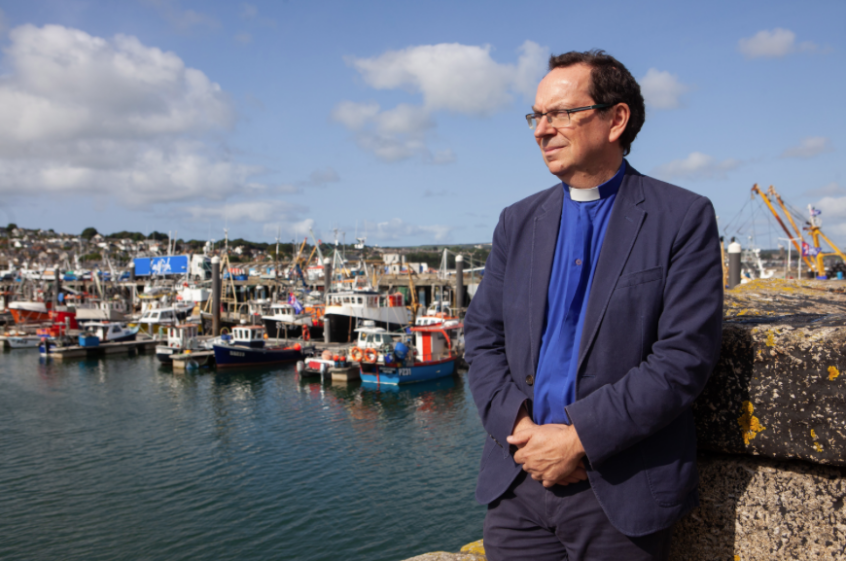There has been much thankfulness among many Anglican evangelicals about the church's newest bishop.
The announcement that Philip Mounstephen, who currently heads the Church Mission Society (CMS), is to be the next Bishop of Truro has generally been reckoned as good news for evangelicals in the Church of England.

Philip Mounstephen is widely recognised as someone who will do the sorts of things bishops do with godliness, kindness and competence. In a statement accompanying the announcement, he said: 'The Diocese of Truro exists to love and serve the people of Cornwall in word and deed in the name of Jesus Christ and in the power of his Spirit – and my job is to lead the diocese in that calling.' And who could argue with that? Moreover, Anglicanism in Cornwall has sometimes seemed quite hostile to evangelicals, so his appointment can be seen as a bit of a breakthrough for them.
But amid all the rightful praise, an awkward question was posed in one of the online discussion groups of which I am a member. And the query was simply this: 'Is he a complementarian?' It was an astute point. For those of you who don't keep up with theological language, there are basically two views of men's and women's ministries in Anglicanism. The first might be termed 'egalitarian' (men and women are equal and their roles within the church should thus be identical, with both being bishops); the second is 'complementarian' (men and women are equal but different and therefore their church roles should be different; women should not have 'headship' over men in the church).
While many might be tempted to dismiss the latter view as patriarchal misogyny in the guise of theology, I have to say that most of the complementarians I know hold their position for deeply-held reasons of conscience rooted in a reverence for God, passion for the Bible, and a desire to be faithful. And that includes quite a few women. Moreover, most of Christianity worldwide – the Roman Catholic and Eastern Orthodox Churches – takes a 'complementarian' view.
When the Church of England decided to ordain women as bishops, it bravely sought some kind of formula which would hold these two parts of its body together. Arising out of this came something with the slightly Maoist-sounding title of 'The five guiding principles'. The aim was 'mutual flourishing' for both egalitarians and complementarians.
So how has that worked out in practice? Well, according to answers given at the most recent General Synod, since the legislation on women bishops came into force in November 2014, 14 women have been appointed as bishops, three as deans and 20 as archdeacons. At the same time, no-one who is unable for conscientiously-held theological reasons to recognise the 'priestly' or episcopal ministry of women has been appointed as an archdeacon or dean.
Furthermore, during the same period, just two 'suffragan' (or more local) bishops who do not ordain women have been announced (one of whom is evangelical). No diocesan bishops (the regional tier 'above' suffragan bishops) who are complementarians have been installed. The last attempt to do so ended in farce following what some have seen as a witch-hunt against Anglo-Catholic complementarian Philip North. This is hard to square with the church's own Faith & Order Commission publication The Five Guiding Principles: A Resource for Study (2018). That document speaks of 'not corralling some within the boundaries of their own parishes or networks, but providing space generously for all to flourish in its common life and in structures shared by all'.
This lack of complementarian bishops should concern all wings of the church. Complementarian evangelicals and Anglo-Catholics understandably feel patronised and betrayed. But egalitarian evangelicals should also be concerned: after all, these other traditionalist evangelicals probably share 98 per cent of their theological DNA; they are fellow brothers and sisters. And in debates about the future direction of the wider Church of England, they are going to need to work together. Egalitarian evangelicals need to be asking: how can we help our close friends and allies here? What can we do?
But liberals who truly are 'liberal' should also be concerned. If they really want a broad, inclusive and diverse church, well then – where's the inclusivity and diversity on this particular issue? Does 'loving your neighbour' only extend to those with whom you agree? Does (even) 'loving your (theological) enemy' include everyone but complementarians?
All in all, it is a shabby state of affairs. After all, if the church's 'five guiding principles' in this matter aren't worth the paper on which they are written, why should anyone from any wing of the church believe possible future assurances which might be given to any grouping in the church – liberal or conservative – when issues of sexuality are discussed? The answer is that they won't. And neither – unless this particular situation changes – should they. As someone rather significant once said, 'Let your yes be yes.' I don't think he meant, 'Let your yes be a probably not.' Do you?
David Baker is a former daily newspaper journalist now working as an Anglican minister in Sussex, England. Find him on Twitter @Baker_David_A













